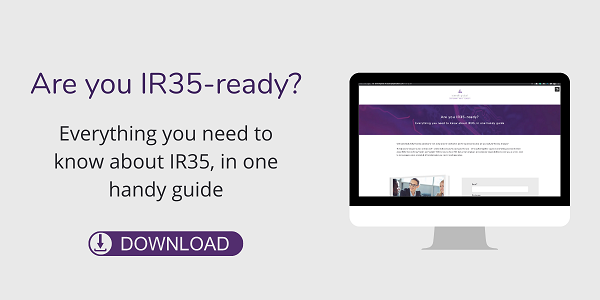A 2019 survey conducted by legal firm, Brookson, revealed that, last year, private sector businesses were wholly unprepared for IR35 changes. Just 3% of the contractors they surveyed believed that hiring businesses would take the action needed to fully implement IR35 policies, while 80% stated that they would be more likely to find a new role with other businesses who had put the right changes in place.
The IR35 reforms, which already apply to the public sector and which come into play for all private businesses in April 2021, signify enormous changes to employment tax regulations. With potentially hefty financial penalties for non-compliance, it is vital that businesses who haven’t yet prepared for these regulation changes put plans in place to ensure that everything is in order when April comes around.
Register for our upcoming webinar: IR35: What do employers need to do before April 2021? Dec 10, 2020 10:00 AM.
Here are four things that you should do to get ready for the new IR35 legislation, to avoid any nasty surprises when the new rules kick in.
1. A review of all permanent and contract staff
Individual businesses are responsible for determining exactly which of their staff and contractors will be considered to be either inside or outside of IR35 status.
While HMRC has created the CEST – Check Employment Status for Tax – service, allowing businesses to establish whether an individual working through a limited company should be classed as employed or self-employed for tax purposes, Brookson advise that use of this tool alone is not a wise approach. With its simple yes/no/undertermined algorithm, there is great potential for status to be wrongly determined. This could, in turn, lead to HMRC demanding National Insurance Contributions that have not been deducted for a worker who is subsequently deemed to be inside IR35, as well as penalties and interest on late payments. In addition, with HMRC having disregarded CEST assessments in previous IR35 tribunals, there are questions over whether this tool is 100% effective. Instead, Brookson recommends either having in-house expertise, or hiring a professional recruitment law firm to establish whether IR35 rules are likely to be a concern.
“Businesses should undertake an audit of their supply chain.”
In addition to reviewing existing staff contracts, businesses should undertake an audit of their supply chain, to ensure that any recruitment companies they work with are compliant with the new IR35 rules. Businesses should also ensure that they are aware of how every single member of the team has been hired: in larger organisations, it is estimated that there are, on average, over 50 contractors who have been hired outside of the normal recruitment procedures.
2. Establish likely financial and administrative costs
Once you have established which of your workers will fall under this new intermediaries legislation, you will need to calculate how much compliance will likely cost your business – in both financial and administrative terms. For small businesses especially, it may be that the costs of retaining contractors within these new rules is unaffordable – and therefore serious consideration needs to be taken with your recruitment strategy before IR35 comes into force. It may be that you need to find either a permanent or fixed term contract replacement – and it could be that you look for a hire with the the same skills who may be cheaper or willing to work inside IR35.
3. Communicate changes effectively
Every current and future contractor within your company – whether a sole trader, a limited company or a personal service company – should have all IR35 changes communicated to them in a clear, transparent and timely manner. With any wholesale change within a business, contractors will be less likely to challenge the status quo if they feel that they have been given time to prepare, as well as being given the opportunity to offer their own feedback and personal input.
Ultimately, keeping contractors well-informed and involved throughout the process will maintain a good level of trust, as well as a solid relationship. It will help them to understand that these new tax efficiency rules are something that is unavoidable, and may help to establish ways in which you can continue the working relationship should they fall under IR35’s remit.
4. Establish new recruitment processes
While the previous three points cover existing contractors, it is also vital to prepare your business for workers that you may recruit in the future.
Any recruitment advert should make it transparently clear whether an advertised role is for a contracted period of work by an individual who is truly self-employed, or if it is likely to be something more permanent. Essentially, both the hiring business and prospective applicants should easily be able to see whether a role is inside or outside IR35 rules.
Some businesses are already starting to make changes to the wording of their job adverts – using terms like “PAYE only”, “umbrella only” or “inside IR35”, or “outside IR35” for roles where the new rules do not apply. However, despite the presence of such wording appearing on job adverts, it is still vital for the hiring organisation and the contractor to discuss the role and its remits in full, to avoid any doubts about IR35 status.
With April 2021 looming fast, businesses that are set to be affected by the new legislation should consider acting as soon as possible to prepare for the new IR35 rules. By putting plans in place now, organisations can not only save themselves hassle closer to the time, but can reassure contractors and prospective contractors that they are taking the new HMRC rulings seriously.
If you need to learn more about the steps you need to take to be IR35-compliant, register for our free webinar.
To find out more about IR35 changes, visit our blog and the Brookson website.

